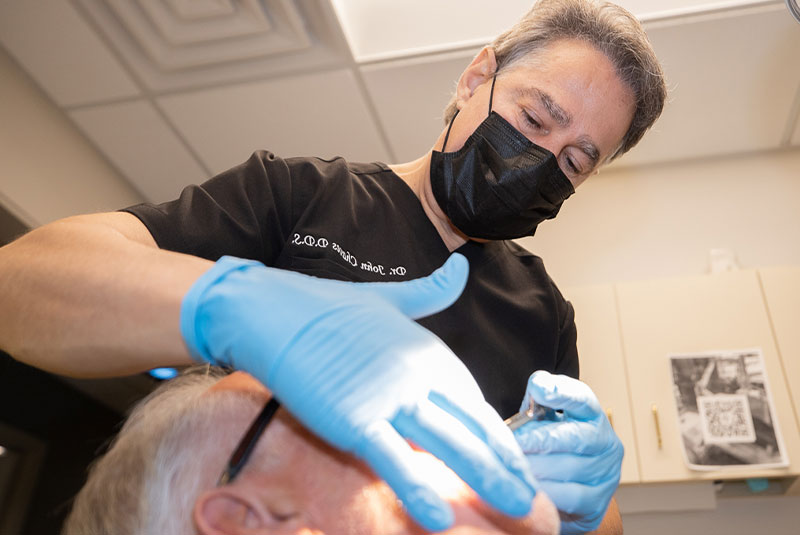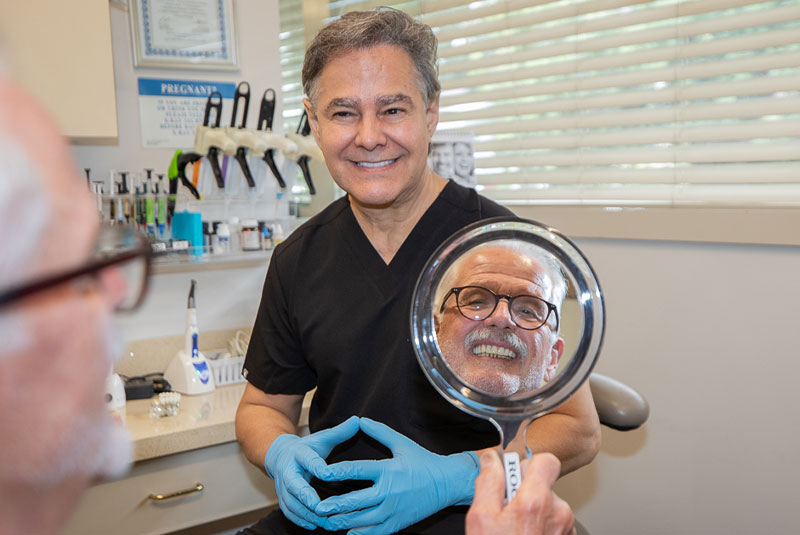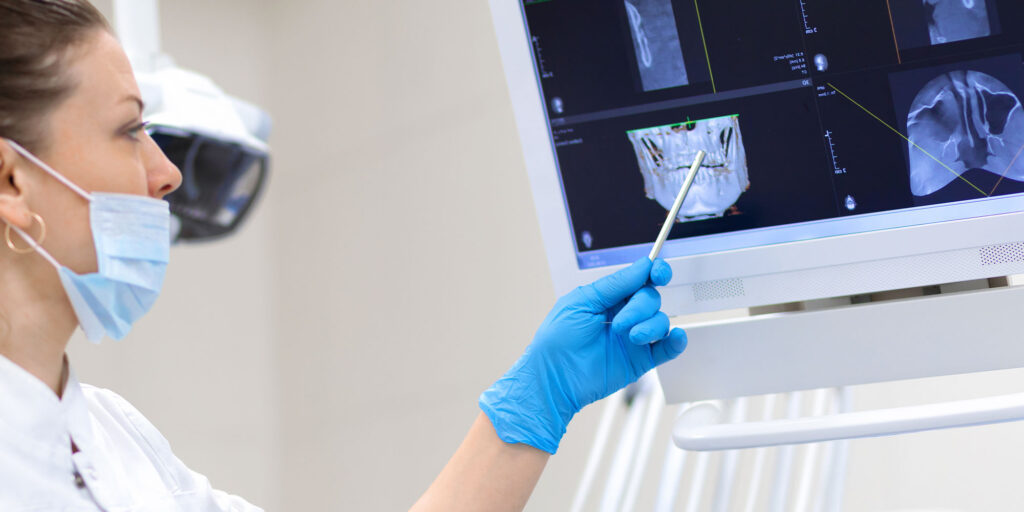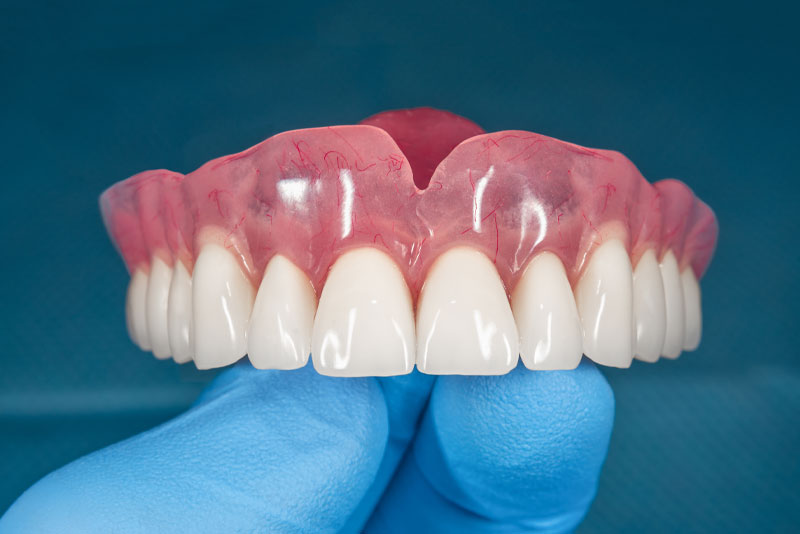


Losing your teeth can be a stressful and difficult experience, but it’s essential to remember that you’re not alone. Millions of people worldwide suffer from tooth loss due to age, injury, or other factors. While traditional dentures have been the go-to solution for many years, they can be uncomfortable and unstable, leading to difficulties eating and speaking.
Fortunately, snap-in dentures supported by a denture implant can enhance and restore your smile. Learn more with our Woodland Hills dentist by calling 818-491-7294 today.
Ready to achieve a beautiful smile? Contact our Woodland Hills dentist today at 818-491-7294 to set up your consultation. With over 30 years of experience, you can count on Dr. Chaves to provide exceptional dental care.
Snap-in dentures, or snap-on dentures, are a type of denture that uses dental implants to provide additional support and stability. These dentures attach to the implants using snaps or other types of connectors, allowing them to stay securely in place. Unlike conventional dentures that sit on top of the gums, snap-in dentures are held in place by implants that are surgically placed into the jawbone. Snap-in dentures work by securely attaching to dental implants, providing a more stable and comfortable fit compared to traditional dentures.
Patients who receive snap-in dentures may receive the following benefits:
Implant Dentures Benefits: Implant dentures offer enhanced stability, longevity, and comfort compared to traditional dentures. They provide a more permanent solution, reducing the need for frequent adjustments and maintenance.

Individuals who possess the following qualities may qualify for snap-in dentures:
To determine what type of denture may work best for you, contact our Woodland Hills dentist today at 818-491-7294 to schedule an appointment.

You’ll meet with our Woodland Hills dentist for an initial consultation. During this appointment, your oral health will be assessed, and your specific needs and preferences will be discussed. We’ll also take impressions of your gums and any remaining teeth to create a personalized dental treatment plan.
Based on the impressions and your preferences, Dr. Chaves will work on designing the snap-in dentures. They’ll determine the appropriate size, shape, and color of the removable dentures, to match your natural teeth and provide a comfortable fit.
In some cases, any remaining damaged teeth might need to be extracted to make way for permanent dentures. Our dentist will perform any necessary extractions and address any oral health issues before moving forward.
Snap-in dentures can be attached using dental implants or can be supported by natural teeth. If you opt for dental implants, this step involves placing small titanium posts into your jawbone. The number of implants will depend on the type of snap-in dentures you’re getting.
While your mouth heals from any extractions or implant placement, you might be given temporary dentures to wear. These regular dentures will help you maintain your appearance and ability to chew during the healing process.
Once your mouth has healed or the implants have integrated with the bone, the dentist will take another set of impressions. These will be used to create the final dentures that will fit precisely in your mouth.
Using the impressions and the treatment plan, the dental lab will create your snap-in dentures. The dentures will be fabricated to ensure a proper fit, optimal comfort, and a natural appearance.
When the final dentures are ready, you’ll visit the dentist for a fitting. Dr. John Chaves will ensure that the dentures fit correctly and make any necessary adjustments to ensure comfort and stability.
If you have chosen implant-supported snap-in dentures, the implants will be tested for stability, and the dentures will be attached to the implants using special connectors. This attachment ensures that the dentures snap securely in place.
In contrast, fixed implant-supported dentures offer a permanent solution by attaching directly to dental implants in the jawbone, providing greater stability and longevity compared to removable options.
After wearing the snap-in dentures for a little while, you might identify areas that need adjustment. Whether it’s pressure points or comfort issues, visit our Woodland Hills dentist for any required adjustments.
Patients should expect to spend between $3,000 to $8,000 for snap-on dentures. Of course, certain factors influence the cost of your denture set, including:
Fixed dentures, such as All on 4 implants, are generally more expensive but offer a more permanent solution compared to traditional dentures.
Yes, snap-on dentures can be removed for cleaning and maintenance. However, they’re designed to stay securely in place during normal activities like eating and speaking. The denture is attached to dental implants using a special attachment mechanism, similar to an implant supported denture, that snaps the denture in place. This allows the denture to be easily removed for cleaning or repair but ensures that it remains firmly in place when needed.
Some tips for caring for your snap-in dentures include:
Yes, snap-on dentures can significantly improve your bite and chewing ability. Since they are anchored to dental implants, they provide a more stable and secure fit compared to traditional removable dentures. This stability allows for better chewing function, as the dentures stay firmly in place during eating. Additionally, the implants help preserve the bone structure in your jaw, which can improve your overall bite alignment and facial appearance over time.
Snap-in dentures can provide a comfortable and stable alternative to traditional dentures for individuals who have lost some or all of their natural teeth. With their ability to snap into place using dental implants, snap-in dentures offer greater functionality and can make it easier to eat a wide range of foods.
If you’re considering snap-in dentures, schedule a consultation with our Woodland Hills dentist by giving us a call at 818-491-7294.


I understand the information disclosed in this form may be subject to re-disclosure and may no longer be protected by HIPAA privacy regulations and the HITECH Act.
